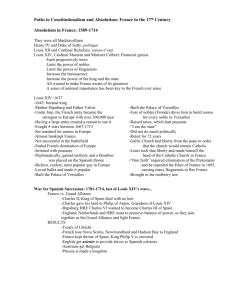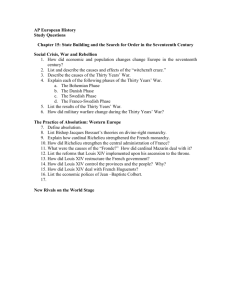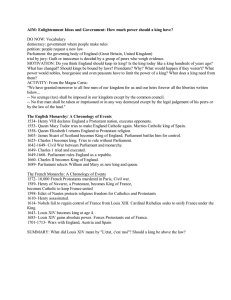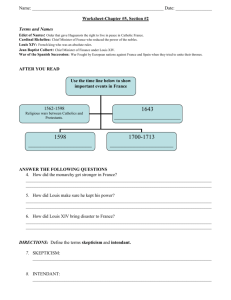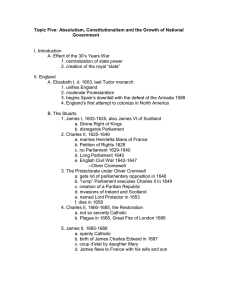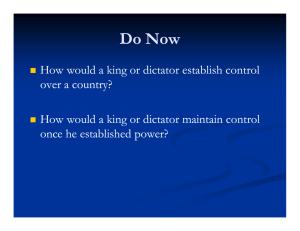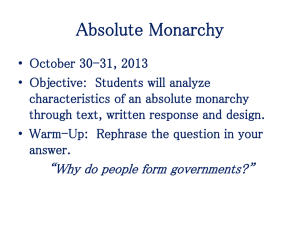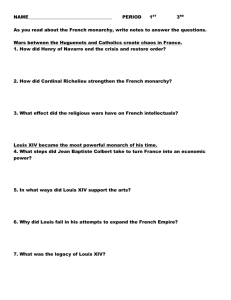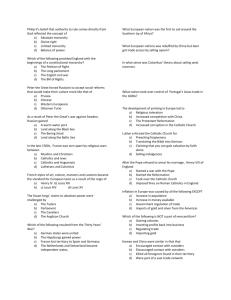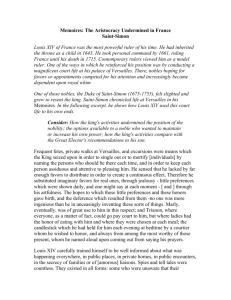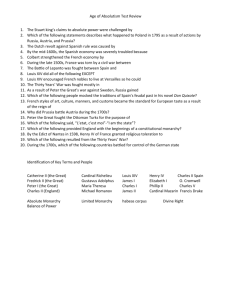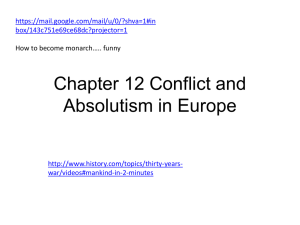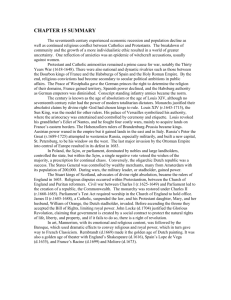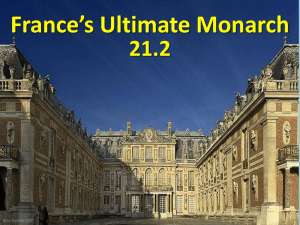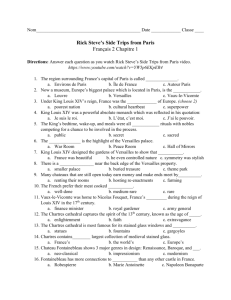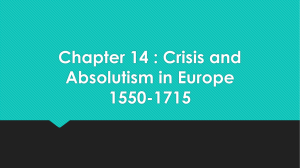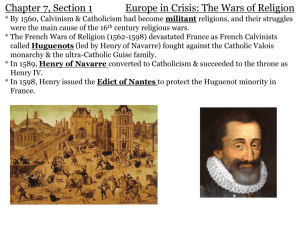Chapter 14 Test Review
advertisement
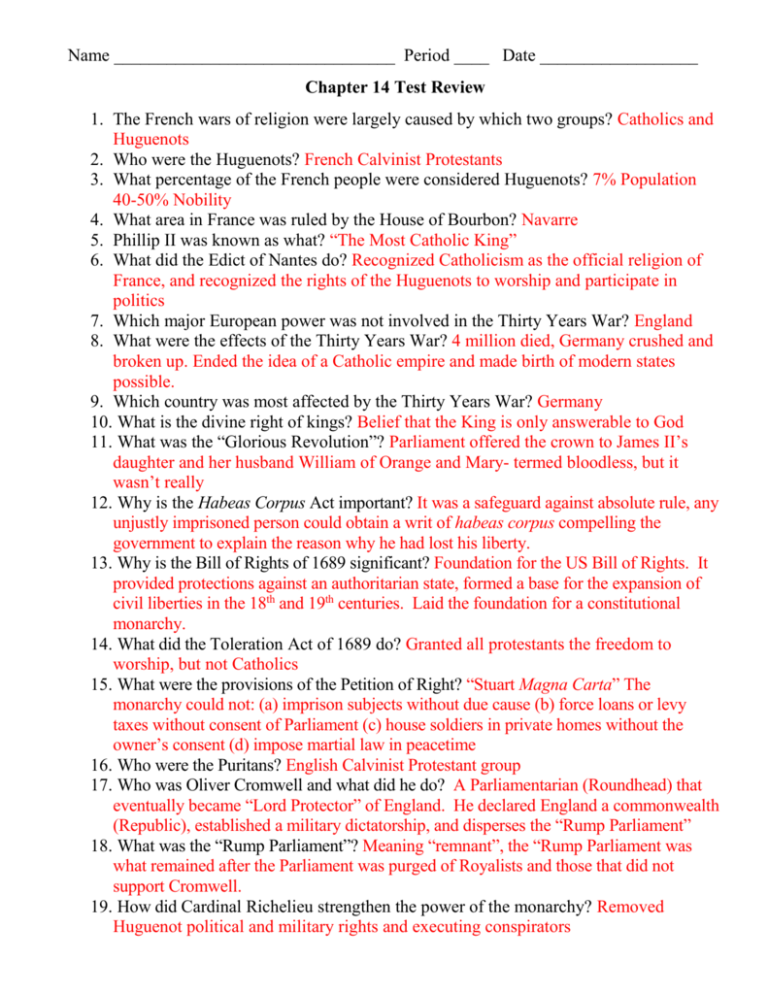
Name ________________________________ Period ____ Date __________________ Chapter 14 Test Review 1. The French wars of religion were largely caused by which two groups? Catholics and Huguenots 2. Who were the Huguenots? French Calvinist Protestants 3. What percentage of the French people were considered Huguenots? 7% Population 40-50% Nobility 4. What area in France was ruled by the House of Bourbon? Navarre 5. Phillip II was known as what? “The Most Catholic King” 6. What did the Edict of Nantes do? Recognized Catholicism as the official religion of France, and recognized the rights of the Huguenots to worship and participate in politics 7. Which major European power was not involved in the Thirty Years War? England 8. What were the effects of the Thirty Years War? 4 million died, Germany crushed and broken up. Ended the idea of a Catholic empire and made birth of modern states possible. 9. Which country was most affected by the Thirty Years War? Germany 10. What is the divine right of kings? Belief that the King is only answerable to God 11. What was the “Glorious Revolution”? Parliament offered the crown to James II’s daughter and her husband William of Orange and Mary- termed bloodless, but it wasn’t really 12. Why is the Habeas Corpus Act important? It was a safeguard against absolute rule, any unjustly imprisoned person could obtain a writ of habeas corpus compelling the government to explain the reason why he had lost his liberty. 13. Why is the Bill of Rights of 1689 significant? Foundation for the US Bill of Rights. It provided protections against an authoritarian state, formed a base for the expansion of civil liberties in the 18th and 19th centuries. Laid the foundation for a constitutional monarchy. 14. What did the Toleration Act of 1689 do? Granted all protestants the freedom to worship, but not Catholics 15. What were the provisions of the Petition of Right? “Stuart Magna Carta” The monarchy could not: (a) imprison subjects without due cause (b) force loans or levy taxes without consent of Parliament (c) house soldiers in private homes without the owner’s consent (d) impose martial law in peacetime 16. Who were the Puritans? English Calvinist Protestant group 17. Who was Oliver Cromwell and what did he do? A Parliamentarian (Roundhead) that eventually became “Lord Protector” of England. He declared England a commonwealth (Republic), established a military dictatorship, and disperses the “Rump Parliament” 18. What was the “Rump Parliament”? Meaning “remnant”, the “Rump Parliament was what remained after the Parliament was purged of Royalists and those that did not support Cromwell. 19. How did Cardinal Richelieu strengthen the power of the monarchy? Removed Huguenot political and military rights and executing conspirators 20. What did Louis XIV call himself and why? The Sun King 21.How old was Louis XIV when he became king? At what age did he truly take power? 4 took power at 23. 22. How did Louis XIV maintain complete authority? He distracted the nobles with court life at Versailles to keep them out of public office 23. For what was the royal court at Versailles used? The King’s home, the center for state offices, to have powerful subjects visit to seek favors. 24. Why did French styles become the standard for Europe? 1. The length of Louis XIV’s rule 2. France became the dominate power of Europe because of the effects of the 30 years war. 3. France became such a dominate force in Europe people began to speak French, and copy the cooking, etiquette, and landscaping of the French people. 4. The palace at Versailles contributed to other countries wanting to hold such grand palaces. 25. What is absolutism? A system of government in which a ruler holds total power. 26. What did Peter the Great and Louis the XIV have in common? Both absolute monarchs who believed in the divine right of kings. 27. What are natural rights? The rights to which humans are born including life, liberty, and property 28.Who followed the principle of mercantilism in order to increase the wealth and power of France? Jean Baptiste Colbert 29. What is a czar? The title of the king of Russia. Russian word for caesar 30. Who are the boyars? Russian nobility 31. Peter the Great forced Russians to accept social reforms that would make their culture more like that of whom? The West, specifically French 32. Why was William Shakespeare called “the complete man of theater”? writer, actor, shareholder 33. What is significant about the artist Gentileschi? At the age of 23, the first woman to be elected to the Academy of Design, famous for portraits about heroines from the Old Testament 34. What is the artist El Greco known for? Mannerist art – the emphasis of showing feeling and emotion over realism. 35. What work of art if Bernini famous for? Completing St. Peter’s Basilica in Rome 36. What are the characteristics of the baroque art form? Dramatic effects to arouse emotion, reflected a search for power, and classic ideals of Renaissance art were combined with spiritual feelings of the 16th century religious revival 37. Who is Lope de Vega? Spanish playwright that wrote over 1500 plays. 38. What famous work did Miguel de Cervantes write? Don Quixote 39. Summarize John Locke’s political ideas. Believed people were good, everyone deserved to have their natural rights (life, liberty, and property), supported the idea of a constitutional government 40. Summarize Thomas Hobbes political ideas. Believed people were selfish. Supported an absolute sovereign, did not feel people had rights. 41. Why did European rulers encouraged ocean exploration? To find new trade routes 42. Who took over control of the spice trade from the Portuguese? The Dutch 43. What did Vasco da Gama’s discovery of a route to India by sea proved to be? Very profitable, since da Gama returned with a cargo of spices and made a profit of severl thousand percent 44. What was the name of the set of principles that dominated economic thought in the seventeenth century? Mercantilism 45. Who were the first European settlers of the Hudson River valley? The Dutch 46. Who explored the New England coastline of the Americas for England? John Cabot 47. According to mercantilists, the prosperity of a nation depended on what? A favorable trade balance, which means greater exports than imports.

